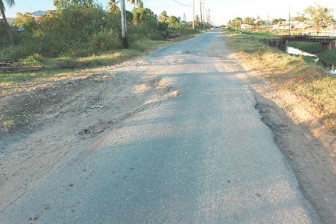The rapid deterioration of a stretch of the Mon Repos, Agriculture Road—in less than a year after construction works—is being blamed on substandard construction work and poor maintenance.
The situation has prompted another call for government to make road building top priority and to look for credible builders.
“Our roads are failing because they are becoming waterlogged; there is no pavement that keeps the foundation from cracking or from developing potholes; they are not crowned for the water to run off; the compaction process is compromised and there is no proper sealing to prevent water from reaching the foundation; there is little maintenance once a road is built – water is allowed to seep under the road,” Hilmon Henry wrote, in a letter carried in the November 1 edition of Stabroek News.
Henry added that the prolonged dry spell being experienced has contributed to the road collapsing in some areas, which are in urgent need of repairs, lest the rains come and make things even more unmanageable.

Henry said the stretch of road found after the National Agricultural Research and Extension Institute (NAREI) complex, at Mon Repos, is already deteriorating after being constructed less than a year ago.
He stated that unlike other instances, there is hardly any vehicular activity on this road, especially by heavy-duty trucks and other vehicles which tend to do damage to roads.
The man went on to say that though remedial works have been done on the road, remaining collapsed sections and potholes still pose a threat to anyone who might be speeding, especially at night.
According to Henry, in Guyana, many of the roads that are built usually last for just a few years, while in other countries, roads and highways usually last for about 20 years and more.
When asked why many roads usually last less than a year before showing signs of wear, as opposed to roads such as Mandela Avenue and Regent Street which seldom need repairs, an official within the Ministry of Public Works told Stabroek News that the cost to construct roads of that quality is extremely high, and that the ministry simply does not have sufficient funds to build all roads to the same specifications.
The official said that despite this fact, there is still need for the construction of roads so that people can be able to access communities and experience some amount of comfort in the process. As a result, the ministry “stretches” the resources it has at its disposal for road projects, which usually means that the quality of roads constructed is not as it should be.
The official also stated that it is unlikely that the Mon Repos road will be fixed as no funding has been allocated in this year’s budget for such a project.
“There are many roads around the county that need to be repaired, but the reality is that we just cannot repair all of the roads at once, we don’t have the funds necessary, it will take a while,” said the official.
Henry, in the meantime, stated that the government needs to make road building top priority and look for credible builders, who are qualified and have good track records. He stated that good builders will carefully test under the roadways to make sure that the road that will be built has the strength to carry the traffic intended to use it, and that roads last a number of years.





